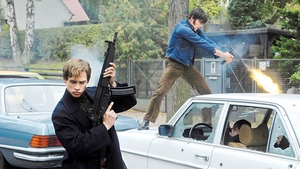Stuart:
German film is always a winner in my books (let’s for a moment forget that Uwe Boll exists), particularly the ones that reach cinemas down under. With recent films like The Lives of Others (Das Leben der Anderen), The Wave (Die Welle) and Sophie School: The Final Days (Sophie Scholl: Die letzten Tage), German filmmakers are constantly examining social upheaval and trying to understand both the rise and consequences fascism and autocracy and how they relate to the country’s rather bleak recent history. If you’ll permit me to make a generalisation about an entire industry, German cinema isn’t afraid to ask tough questions and is rarely guilty of simplifying such issues.
Thus we have The Baader Meinhoff Complex, chronicling the rise of the Red Army Faction, a militant group formed in West Germany in the 60s. I knew absolutely nothing of this period of history, which was a problem when it came to appreciating the film. Whereas a film like Munich (the events of which are important to this film also) is careful to educate those of us ignorant of the relevant history, Uli Edel’s film doesn’t waste any time on getting us up to speed. That’s not to say that the film is incomprehensible – the characters’ motivations are perfectly illustrated, and the themes are easy to grasp – but just that I had to be content not knowing anything about the secondary characters and the roles they played.
I knew absolutely nothing of this period of history, which was a problem when it came to appreciating the film. Whereas a film like Munich (the events of which are important to this film also) is careful to educate those of us ignorant of the relevant history, Uli Edel’s film doesn’t waste any time on getting us up to speed. That’s not to say that the film is incomprehensible – the characters’ motivations are perfectly illustrated, and the themes are easy to grasp – but just that I had to be content not knowing anything about the secondary characters and the roles they played.
Ulrike Meinhof (Martina Gedeck) is a journalist whose writings are highly critical of the German government of the day, which she sees as not only bowing before American imperialism but stifling voices of dissent. The film begins as police attack scores of student protesters at a rally. When one student is shot dead, young ‘radicals’ Andreas Baader (Moritz Bleibtreu), Johanna (Gudrun Ensslin) and Nadja (Brigitte Mohnhaupt) decide to take the next step, and so begin a series of attacks that vary from vandalism to assassination. Ulrike finds herself crossing the line between social commentator and active participant, with horrifying results.
The film is exhaustive in its attempts to fit a great deal of events into the two and a half hour running time. Though proceedings never grow dull, it is a tiring film – I was sure we were at the end when there were in fact 40 minutes left to go. The screenplay is effective in helping us understand how a bunch of students can go from small time – arson – to the extreme – coordinated killing sprees. To its credit, the film manages to find the right balance between sympathising with the antagonists and letting us see the horrendous results of their actions, and the performances are all pretty much perfect.
The Baader Meinhof Complex makes the most of what must have been a very large budget, and the film is beautifully shot, effortlessly blending stock footage. It’s a must for any fans of German cinema or history buffs, though anyone unfamiliar with the events portrayed will feel a little left out.
Rating: